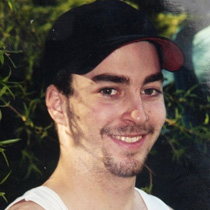Motorists will have to pay before they can pump
Susan Lazaruk
Province

Grant DePatie was killed trying to stop someone from stealing $12.30 worth of gas
Come next weekend, B.C. will become the first province to insist gas station customers pay first and pump later, 24 hours a day.
The transition isn’t going smoothly in all areas.
A new WorkSafeBC regulation referred to as Grant’s Law — after Grant DePatie, who was dragged to his death trying to stop a $12.30 gas-and-dash almost three years ago — begins next Saturday.
“I’m overjoyed with it,” said his father, Doug DePatie, who, with his wife, Corinne, lobbied hard for the law. “It is nice to know that no one will ever die like Grant did, from a gas-and-dash.”
Late-night businesses will also have to ensure at least two workers are on shift from 10 p.m. to 6 a.m. or that solo workers have a locked barrier between them and their customers.
And all workplaces, late-night retail or not, will need to identify, eliminate or control any hazards for employees, said Roberta Ellis of WorkSafeBC.
There was little opposition to the prepay laws from gas companies because the change is mandatory, many pumps already include the option to prepay at the pump and gas stations will lose less to driveaways.
But Ellis said some of the smaller gas bars weren’t happy because they will feel pressure to pay a large expense to upgrade their pumps to allow prepaying by credit or debit cards, even though customers can still use cash to prepay.
Chevron spokeswoman Deirdre Reid said the company is “very supportive of action to keep workers safe” and doesn’t anticipate any problems from customers.
But Pamela Peaker of the Aldergrove Gas Bar said some older customers have voiced their anger about the change since she posted notices about two weeks ago.
“They worry they will have to line up twice [if they miscalculate what they need],” she said. “People have gone from yelling at us to storming out. I’ve actually had to ask some of them to leave the gas bar. This is [happening] all day long.”
And confusion over whether member-owned co-ops would be exempt has had customers raging against each other in loud arguments in the lineups, prompting the Co-op to print an information brochure.
Richard Morris, a gas jockey on Gabriola Island, where everyone knows everyone, said: “The majority of people are angry [about prepaying]. They say, where are people going to go on an island?”
But he said the gas station gets a driveaway every couple of days, “usually by accident, if they’re chatting or something,” and Morris welcomes the change.
“It’s just an adjustment,” he said. “They’ll get used to it.”
Doug DePatie, who would like to see prepay spread across Canada, has contacted other provincial labour ministers.
The change will likely make B.C. the largest jurisdiction in North America to institute a mandatory prepayment law.
Prepay is common in the U.S., where laws are passed by municipalities, not states.
In the U.S., stations in smaller or rural areas worry that fewer customers will visit the convenience stores to purchase the higher-markup items if they prepay, and owners will pay more in processing costs for credit and debit transactions.
About half of U.S. states have instead toughened penalties so judges can suspend the licences of gas-and-dash drivers.
© The Vancouver Province 2008
